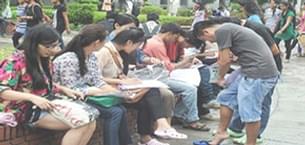PhD in Singapore is a 3-5 year full-time program, which is the highest academic degree that one can earn in any field. It includes access to world-class research facilities, highly qualified faculty, and a multicultural environment that fosters collaboration and innovation. The minimum admission requirement for PhD in Singapore is to carry a Master’s degree or equivalent qualification from a recognized institution with prior research experience. The application process typically involves submitting an online application, academic transcripts, letters of recommendation, a personal statement, and proof of language proficiency. Some programs may also require applicants to take a standardised test, such as the GRE or GMAT.
The average tuition fees for a PhD at the top universities in Singapore vary depending on the university and program of study. For international students, the cost can range from SGD 28,000 to SGD 50,000 per year, which is approximately INR 17,00,000 to INR 30,00,000. In addition to tuition fees, students should also consider the cost of living in Singapore, which can be relatively high compared to other countries in the region. However, there are several scholarships and financial aid options available for
Also Check: Study in Singapore
PhD in Singapore: Course Highlights
| Program | PhD in Singapore |
| Program Type | Coursework | Research-only | Part-time | Full-time |
| Program duration | 3-5 years |
| Eligibility criteria | A Master’s degree or equivalent qualification from a recognized institution with prior research experience |
| GPA | 3.0 on a 4.0 scale (83-86%) |
| English proficiency requirements | IELTS : 6.5-7.0 | TOEFL-iBT : 85 - 100 |
| Tuition fee range | SGD 28,000 – SGD 50,000 (INR 17,30,865- 30,90,832) |
| Average Salary | SGD 101,000 (INR 62,43,480) |
| Top Employers | BioMind | Google | A*STAR | Sembcorp Industries | IQVIA | Mathrix | LSEG | Microsoft | NUS | GSK | Temasek holdings |
PhD in Singapore: Top Universities
The following table shows the top universities offering PhD in Singapore for international students in different disciplines like Biological Science, Accounting, Psychology among other areas along with their admission deadline and annual tuition fees:
| University | Program | Deadlines | Annual Tuition Fees (SGD) |
|---|---|---|---|
| National university of Singapore | PhD Biological Sciences | PhD Chemistry | PhD Food Science and Technology | PhD Mathematics | 15th May 2023 (January intake) | 15th November 2023 (August intake) | 40,800 |
| Nanyang Technological university | PhD Biological Sciences | PhD Civil and Environmental Engineering | PhD Computer Science | 31st July 2023 | 35,850- 42,300 |
| Singapore Management university | PhD Business | PhD Accounting | PhD Psychology | 31st December 2023 (For PhD in Accounting, PhD Asian Urbanisms, PhD Business, PhD in Economics and PhD Psychology) | 31st January 2024 (For PhD in Computer Science, PhD in Information Systems, and PhD in Law) | 30th June 2023 (For PhD in Computer Science and PhD in Information systems) | 35,300 |
| Singapore Institute of Technology | PhD Engineering | PhD Clinical research in health sciences | Rolling basis done on 3 intakes: September, January, and May | 31,000 |
| Singapore University of Technology and Design | PhD Science, Maths & Technology | PhD Engineering Systems and Design | 31st March 2023 | 51,628 |
| Singapore University of Social Sciences | PhD Engineering | PhD Gerontology | 15th April 2023 | 36,000 |
| NUS Business school | PhD in Management | 15th December 2023 | 21,146- 33,712 |
| Newcastle university | PhD Chemical Engineering | PhD Marine Engineering | PhD Mechanical Engineering | Rolling basis throughout the year | 84,000 |
| INSEAD | PhD in Management | 15th December 2023 | 48,000 |
| James Cook university | PhD Architecture | PhD Information Technology | PhD Health | Rolling basis throughout the year | 140,940 |
Explore: Top Universities/Colleges in Singapore
Why Study PhD in Singapore?
- Singapore has a strong research and development industry, which offers many opportunities for PhD graduates to pursue academic, research, or industry roles. The country's universities are ranked highly in global university rankings, and many have world-class research facilities and faculty. This, in turn, increases the demand for PhD graduates in Singapore's job market.
- PhD graduates in Singapore have excellent graduate employability prospects. According to the Global University Employability Ranking 2022, two Singaporean universities, Nanyang Technological University and the National University of Singapore, are ranked in the top 20 universities in the world for graduate employability. This demonstrates that PhD graduates from these universities are highly valued by employers in Singapore and around the world.
- PhD graduates in Singapore can expect to earn higher salaries than those with lower qualifications. According to the 2022 Robert Walters Salary Survey, PhD graduates in Singapore can expect to earn a salary range of SGD 80,000 to SGD 150,000 (49 lakhs to 92 lakhs INR) per annum, depending on their field of study and industry.
PhD in Singapore: Admissions
The admissions process for a PhD program in Singapore typically involves several steps. First, prospective students must check the eligibility criteria of the university and program of interest. This may include requirements related to educational background, research experience, English proficiency, and other factors. If a student meets the eligibility criteria, they may then submit an application, which typically includes academic transcripts, a research proposal, letters of recommendation, and other supporting documents.
Also Read:Admission to Singapore Universities
Eligibility Criteria
Entry requirements for international students to obtain a PhD differ from one university to another. However, the general requirements that one must meet to be eligible for PhD admission are:
- Academic Degree- A Master’s degree or equivalent qualification in a related discipline from a recognized institution
- Minimum GPA- 3.0 on a 4.0 scale
- GRE or GMAT Score- A high competitive GRE or GMAT score is required
- English Proficiency Test Score- IELTS: 6.5-7.0 | TOEFL-iBT: 85-100
- Statement of Purpose (SOP)- A 1-2 page essay showing your interest in the program and your future plans.
- Letters of Recommendation- 2-3 LoRs
- Coursework- Depends on the field of study and the research focus of the program.
- Experience- Generally two years of professional work experience required
Explore: Exams to study in Singapore
PhD in Singapore: Admission Requirements
The table below displays the specific admission requirements set by each university for all the applicants to get into their PhD in Singapore for international students:
| University | Academic requirement | GMAT/GRE score | Additional documents |
|---|---|---|---|
| National university of Singapore | 4-year bachelor’s degree with honours or master’s degree from a related discipline from a related discipline | Required | Proof of English language proficiency| 2 LoRs |
| Nanyang Technological university | 4-year bachelor’s degree with honours or distinction | Required | Proof of English language proficiency | Official transcripts of achievements/certificates | Two academic references | Research proposal | Resume/CV |
| Singapore Management university | 4-year bachelor’s degree with strong academic background | Required | Proof of English language proficiency | Official transcripts of achievements/certificates| Two academic references| Personal statements | Research proposal | Resume/CV |
| Singapore Institute of technology | Current employees with bachelor’s degrees | Strong research proposal | Not required | None |
| Singapore university of Technology and Design | A bachelor’s degree with excellent academic records | Not required | Proof of English language proficiency | Submission of thesis |
| Singapore university of Social Sciences | A master’s degree or equivalent qualification from a recognized institution | Not required | Proof of English language proficiency | Two years of professional work experience | Personal Statement | Research proposal |
| NUS Business school | A bachelor’s degree with excellent academic records | Minimum GRE score 320 | Proof of English language proficiency | Research proposal | Official transcripts of achievements/certificates | Two letters of recommendation |
| Newcastle university | A 2:1 honours degree from a recognized institution | Not required | Proof of English language proficiency | Research proposal | Personal statement | CV/resume |
| INSEAD | Bachelor’s degree from a recognized institution | Required | Proof of English language proficiency | CV/resume | Degree transcripts and certificates | 3 letters of recommendation | Research proposal |
| James Cook university | A second-class honours degree or a research master’s degree from a recognized institution | Not Required | Proof of English language proficiency | CV/resume | Research proposal |
PhD in Singapore: Cost of study
The cost of studying for a PhD in Singapore can vary depending on several factors, such as the university and program chosen, the student's nationality, and whether they receive any scholarships or funding. Generally, tuition fees for international students can range from SGD 25,000 to SGD 60,000 (INR 15,00,000 to INR 37,00,000) per year, while living expenses can range from SGD 10,000 to SGD 20,000 (INR 6,00,000 – 12,00,000) per year. However, there are many funding opportunities available to support PhD students, including scholarships, research grants, and stipends, which can significantly reduce the overall cost of PhD in Singapore.
PhD in Singapore: Tuition Fees
The tuition fees vary from around for most universities. The following table shows the total tuition fees for several Singaporean universities to pursue a PhD:

| University | Total Tuition Fees (SGD) | Fees for Indian students (INR) |
|---|---|---|
| National university of Singapore | 45,000 | 27.80 Lakh |
| Nanyang Technological university | 42,300 | 26.13 Lakh |
| Singapore Management university | 35,300 | 21.81 Lakh |
| Singapore Institute of Technology | 31,000 | 19.15 Lakh |
| Singapore university of Technology and Design | 51,628 | 31.90 Lakh |
| Singapore university of Social Sciences | 36,000 | 22.24 Lakh |
| NUS Business school | 33,712 | 20.89 Lakh |
| Newcastle university | 84,000 | 51.90 Lakh |
| INSEAD | 48,000 | 29.65 Lakh |
| James Cook university | 140,940 | 87.08 Lakh |
Cost of Living in Singapore
The following table shows the average annual expense for the various types of expenses and the total cost of living in Singapore:
| Expense Type | Average Annual Expense (SGD) | Cost for Indian students (INR) |
|---|---|---|
| Accommodation | 15,600 | 9.64 Lakh |
| Meals | 4,500 | 2.78 Lakh |
| Transportation | 1,200 | 74,188 |
| Health insurance | 2,500 | 1.54 Lakh |
| Personal expenses | 6,000 | 3.70 Lakh |
| Total | 29,800 | 18.42 Lakh |
Explore: Student Accommodation in Singapore

PhD in Singapore: Scholarships
The following table shows the list of PhD scholarships in Singapore and their details, which are available for International students:
| Scholarship | Eligibility criteria | Award Value |
|---|---|---|
| President’s Graduate Fellowship | Strong academic performance | Strong research potential | Monthly stipend of SGD 3,100 | Full tuition coverage | One-time air travel allowance | One-time settling allowance of SGD 1,000 |
| NUS Research Scholarship | Graduated with a 2:1 upper-class honors degree | Monthly stipend of SGD 1,900 | Full tuition coverage |
| NUS-SINGA scholarship | Strong academic performance and excellence | Monthly stipend of SGD 2,200 | Subsidies on tuition fees | One-time air travel allowance | One-time settling allowance of up to SGD 1,000 |
| AI Singapore scholarship | Must pursue PhD in Singapore-based universities | Strong research potential | Monthly stipend of up to SGD 6,000 |
| The INSEAD Fellowship | Strong academic performance | Tuition fee waiver | Monthly stipend | Health insurance coverage |
| Nanyang President’s graduate scholarships | Honours degree equivalent at the bachelor’s level | Strong academic performance and research potential | Monthly stipend of SGD 3,100 | Conference, Book, IT, and Thesis allowances of up to SGD 1,000 |
| A*STAR Singapore International Graduate Award | Strong academic performances | Good English skills | Good reports from references | Full tuition fee coverage | Monthly stipend of SGD 2,200 | One-time air travel allowance of up to SGD 1,500 | One-time settling allowance of up to SGD 1,000 |
Also Read: List of Popular Scholarships in Singapore
PhD in Singapore: Job Opportunities
After the successful completion of a PhD, graduates can expect placements for top managerial positions. The following table shows the average annual salary that PhD graduates can expect for different positions:

| Profession | Average Salary (SGD) | Salary for Indian Student (INR) |
|---|---|---|
| University professors | 140,000 | 86.50 Lakh |
| Research Scientist | 71,386 | 44.10 Lakh |
| Government Researcher | 75,000 | 46.34 Lakh |
| Data scientist | 70,617 | 43.63 Lakh |
| Senior Consultant | 91,863 | 56.65 Lakh |
| Biomedical Scientist | 62,500 | 38.61 Lakh |
Explore: Jobs in Singapore for International Students
PhD in Singapore: Return on Investment
The following table shows the comparison between total tuition fees and average salary per year for various universities:

| University | Total Tuition fee (SGD) | Average Graduate Salary per year (SGD) |
|---|---|---|
| National university of Singapore | 45,000 | 58,000 |
| Nanyang Technological university | 42,300 | 64,000 |
| Singapore Management university | 35,300 | 81,000 |
| Singapore Institute of technology | 31,000 | 108,000 |
| Singapore university of Technology and Design | 51,628 | 80,000 |
| Singapore university of Social Sciences | 36,000 | 90,000 |
| NUS Business school | 44,000 | 56,000 |
| Newcastle university | 84,000 | 156,000 |
| INSEAD | 48,000 | 108,000 |
| James Cook university | 140,940 | 148,000 |
PhD in Singapore: Degree Comparison
The following table shows the comparison of various parameters to obtain a PhD in Singapore as well as the PhD in USA and PhD in UK:
| Parameter | PhD in Singapore | PhD in USA | PhD in UK |
|---|---|---|---|
| Duration | 3-5 years | 4-7 years | 3-4 years |
| Average Tuition fees | SGD 28,000 – 50,000 (INR 17,31,180 – 30,91,393) | $ 28,000 - $ 55,000 (INR 22,99,365 – 45,16,611) | £ 21,000 (INR 22,36,750) p.a |
| Cost of living | SGD 22,500 (INR 13,91,127) | $ 18,000 (INR 14,89,356) | £ 11,500 (INR 9,51,533) |
| English proficiency tests | IELTS: 6.5-7.0 | TOEFL-iBT: 85-100 | IELTS: 6.0-6.5 | TOEFL-iBT : 79 overall | IELTS: 6.5 | TOEFL-iBT : 90 overall |
| Visa | Student’s Pass | F-1 student visa | Tier-4 study visa |
| Average Salary | SGD 85,000 (INR 52,55,368) | $ 103,000 (INR 84,62,377) | £ 49,000 (INR 43,80,753) |
Explore: Singapore Student Visa
In conclusion, pursuing a PhD in Singapore can be a great opportunity for those seeking high-quality education and research opportunities. Singapore offers a vibrant and multicultural lifestyle, with opportunities for exploring the city, trying diverse cuisines, and participating in various cultural events. Pursuing a PhD in Singapore for Indian students or any international student can lead to various career prospects, including academic positions, research positions, industry jobs, and entrepreneurship opportunities. Overall, Singapore provides a conducive environment for academic and research excellence, making it a great destination for pursuing a PhD
Also Check: Singapore Work Visa
FAQs
Ques. What are the eligibility requirements for pursuing a PhD in Singapore?
Ans. Eligibility requirements for a PhD in Singapore vary by university and program, but typically require a relevant master's degree or equivalent, strong academic background, a research proposal, and English proficiency. Supporting documents such as academic transcripts, letters of recommendation, CV/resume, etc., can also be included for application.
Ques.Are PhD students in Singapore eligible for scholarships and funding?
Ans. Yes, PhD students in Singapore are eligible for various scholarships and funding opportunities, including government grants, industry funding, and university-specific scholarships. Applicants need to check the university and government to know about the requirements of various scholarships available.
Ques.How long does it typically take to complete a PhD in Singapore?
Ans. The duration of a PhD in Singapore varies depending on the program and the field of study. Typically, a PhD program in Singapore takes between 3 and 5 years to complete. However, some programs may take longer, particularly in areas that require extensive fieldwork or experimentation. Students are generally expected to complete their research and submit their thesis within a specific time frame, but the exact duration may vary depending on the requirements of the university and the student's progress.
Ques.Is English proficiency required for pursuing a PhD in Singapore?
Ans. Yes, English proficiency is typically required for pursuing a PhD in Singapore, and most universities accept scores from TOEFL, IELTS, or other English proficiency tests. International applicants must include scores of English proficiency tests with their application to get selected for admission.
Ques.Are PhD students in Singapore allowed to work part-time?
Ans. Yes, PhD students in Singapore are generally allowed to work part-time, subject to certain conditions. Full-time PhD students are allowed to work up to 16 hours per week during the academic term and up to 40 hours per week during term breaks. However, this may vary depending on the university and the specific program. Students must also obtain approval from their supervisor and the university before taking up part-time work.
Ques.What are the research areas available for pursuing a PhD in Singapore?
Ans. There are various research areas available for pursuing a PhD in Singapore, including engineering, science, business, humanities, social sciences, and more. Research areas differ from university to university so check with the university website for more information
Ques.Are PhD students in Singapore required to publish research papers?
Ans. Yes, PhD students in Singapore are typically required to publish research papers in peer-reviewed journals as part of their program requirements. The research papers will be reviewed by the admissions committee to enroll the applicant to their research programs
Ques.What are the career prospects after completing a PhD in Singapore?
Ans. Singapore offers several opportunities for individuals who complete a PhD The country's robust research and development industry provides many options for PhD holders to pursue academic, research, or industry roles. There are also many opportunities to work in the government sector, including research institutes, think tanks, and policymaking bodies. With Singapore's focus on innovation and entrepreneurship, PhD holders can also explore start-up ventures and consultancy work.
Ques.What are the living expenses for international students pursuing a PhD in Singapore?
Ans. The living expenses for international students pursuing a PhD in Singapore can vary depending on the lifestyle and accommodation choices, but typically range from SGD 10,000 to SGD 20,000 (INR 6,18,166 – 12,36,332) per year. The costs may increase depending on the expenditure of the students as well.
Ques.What is the admission process for pursuing a PhD in Singapore?
Ans. The admission process for pursuing a PhD in Singapore typically involves submitting an application form, academic transcripts, research proposal, English proficiency test scores, letters of recommendation, and other supporting documents. Shortlisted applicants may also be required to attend an interview. Selected candidates will be intimated via mail or the university portal regarding their admission













1608788734.png?tr=w-305,h-145,c-force?h=175&w=350&mode=stretch)










Comments